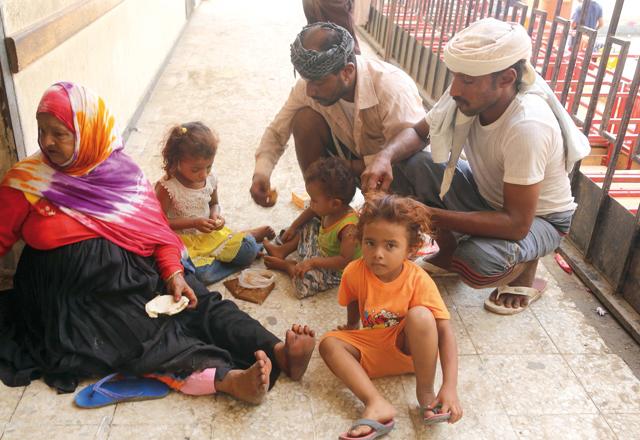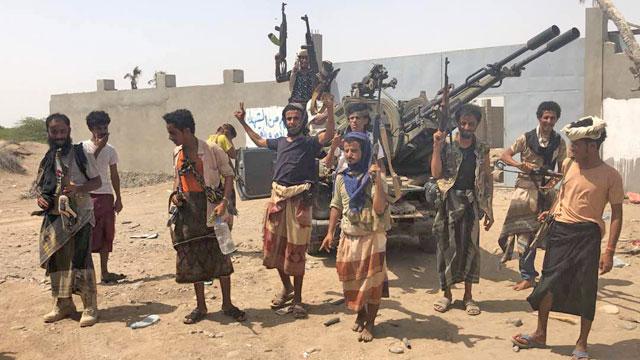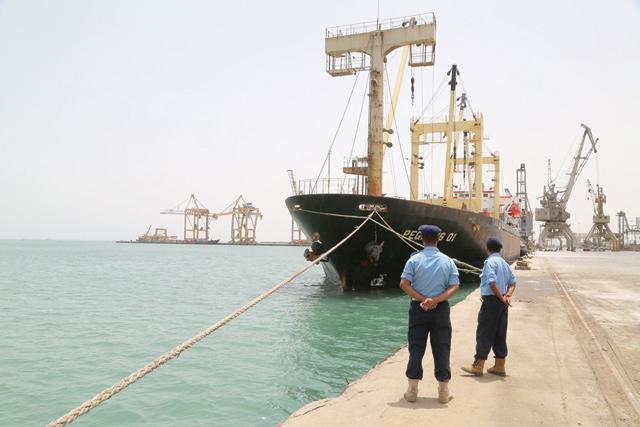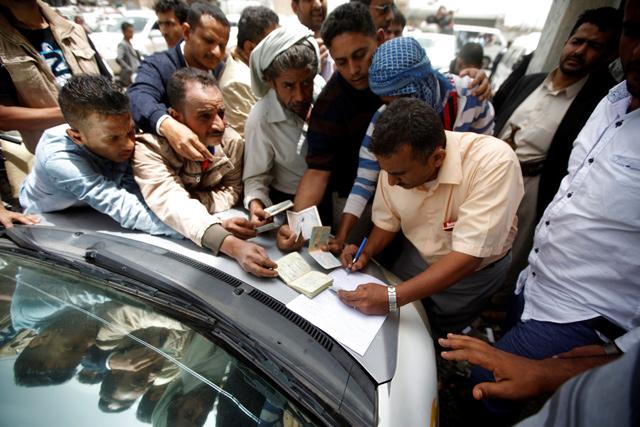You are here
Arab coalition bombs Houthis around Hodeida airport
By Thomson Reuters Foundation - Jun 19,2018 - Last updated at Jun 19,2018

Members of displaced Yemeni families who fled battles between government forces and Houthi fighters near the Hodeida airport share a meal on the balcony of a school used as temporary housing inside the city of Hudeida on Sunday (AFP photo)
ADEN, Yemen — Arab coalition aircraft bombarded Houthi fighters holed up at the airport of Yemen's main port Hodeida, on Monday as a senior alliance official said he hoped UN diplomacy could coax the Iran-aligned movement to cede the city to "save the population".
UN officials fear a prolonged battle for Hodeida, where the Houthis are dug in to protect critical supply lines from the Red Sea to their bastion in the capital Sanaa, will aggravate what is already the world's most urgent humanitarian crisis.
The Western-backed Arab alliance launched an onslaught on Hodeidah six days ago in order to turn the tables in a long- stalemated, proxy war between Saudi Arabia and Iran that has compounded instability across the Middle East.
The coalition intervened in Yemen’s war in 2015 after Houthi rebels drove the internationally recognised government into exile. UAE forces are spearheading the Hodeidah offensive, now focused on the airport of the Red Sea city.
On Monday, Apache helicopter gunships fired at Houthi snipers and other fighters positioned on the rooftops of schools and homes in the Manzar neighbourhood abutting the airport compound, according to local residents.
Houthi forces had blocked roads to the airport, they said.
The Houthis’ Al Masira television reported six coalition air strikes on the Duraihmi district in the vicinity of the port.
The upsurge in fighting has wounded dozens of civilians and prevented aid organisations from reaching parts of Hodeidah.
In Geneva, UN human rights chief HH Prince Zeid voiced concern that the Arab offensive could cause “enormous civilian casualties and have a disastrous impact on life-saving aid to millions of people which comes through the port”.
A senior UAE official said the coalition was taking a measured approach to the battle to minimise risks to civilians and was allowing the Houthis an escape route inland to Sanaa.
In addition, 100 trucks of food aid were en route to Hodeida on the road from coalition-controlled Aden and Mokha to the south, UAE Minister of State for Foreign Affairs Anwar Gargash told a news conference in Dubai.
‘Methodical’ offensive
“We have planned diligently around the humanitarian challenge. Our approach is methodical, gradual, calibrated to squeeze, to make a point, to allow the Houthis to do the right thing, which is basically decide to withdraw unconditionally.”
The Houthis’ days in Hodeida were numbered, he said, and they needed to “as much as possible save the population”.
He said the coalition was counting on Martin Griffiths, the UN special envoy for Yemen, to “pull a rabbit out of a hat” and secure Houthi agreement to vacate Hodeida.
Griffiths returned to Sanaa on Saturday for talks. Houthi authorities and the United Nations office in Sanaa said he would stay until Tuesday, after originally saying he would depart on Monday, hinting at possible progress in his discussions.
Iranian President Hassan Rouhani warned on Monday that fresh military action would not resolve Yemen’s crisis.
“The crisis in Yemen should be resolved through political channels...A military approach will fail...Yemen’s stability and security is important for the Middle East,” Rouhani told Qatari Emir Sheikh Tamim Bin Hamad in a phone call.
“We regard as incorrect the adventurous policies of certain regional countries and believe that the continuation of this process will undoubtedly intensify the existing regional crisis,” Rouhani said.
The Houthis, who rule the most populous areas of Yemen, a chronically unstable nation of 30 million people, deny being puppets of Iran and say their revolt is against corruption and foreign invasion.
Gargash estimated the number of Houthi fighters in Hodeida at between 2,000 to 3,000 and described them as “militia, non-descript, not in uniform”, with battlefield tactics revolving around sniper fire and mine-laying. He said coalition forces outnumbers the Houthis but declined to elaborate.
The Arab alliance has asserted that it can take Hodeida quickly enough to avoid interrupting aid and that it would focus on capturing the airport and port and avoid street fighting.
Strong Houthi hold on Hodeidah
But the coalition has not tried to capture such a heavily defended major city since entering the war, and humanitarian groups fear the battle for Hodeida could drag out.
This would intensify the suffering of civilians who have already endured devastating air strikes, port blockades, hunger and a cholera epidemic.
Yehia Tanani said he and his family left Manzar three days ago and walked for 3km, hiding behind walls and under trees to avoid air strikes before finding shelter at a fish farm.
“They told us that some humanitarian organisations are going to send buses but then they said no buses could come in or out. So we started walking on foot carrying our children, sitting every while for rest while the Apaches hovered above us. We were scared not knowing if we’d be shot or not,” Tanani said.
“Now we’re in this school, no mattresses, no electricity, no water, no bathrooms, nothing. And we have children who need medicine, need food, need anything, but we don’t have anything,” he said in a classroom used to house displaced people.
Related Articles
ADEN, Yemen — Arab coalition troops stormed the airport in Yemen’s main port Hodeida on Tuesday and captured large areas of the compound in
ADEN — Yemen's warring parties started fresh UN-sponsored talks in Jordan on Monday, Yemeni officials said, two days after Houthi forces beg
AL KHOKHA, Yemen — A Saudi-led coalition riding high over its successful capture of Hodeidah airport from the Iran-aligned Houthis faces a d














